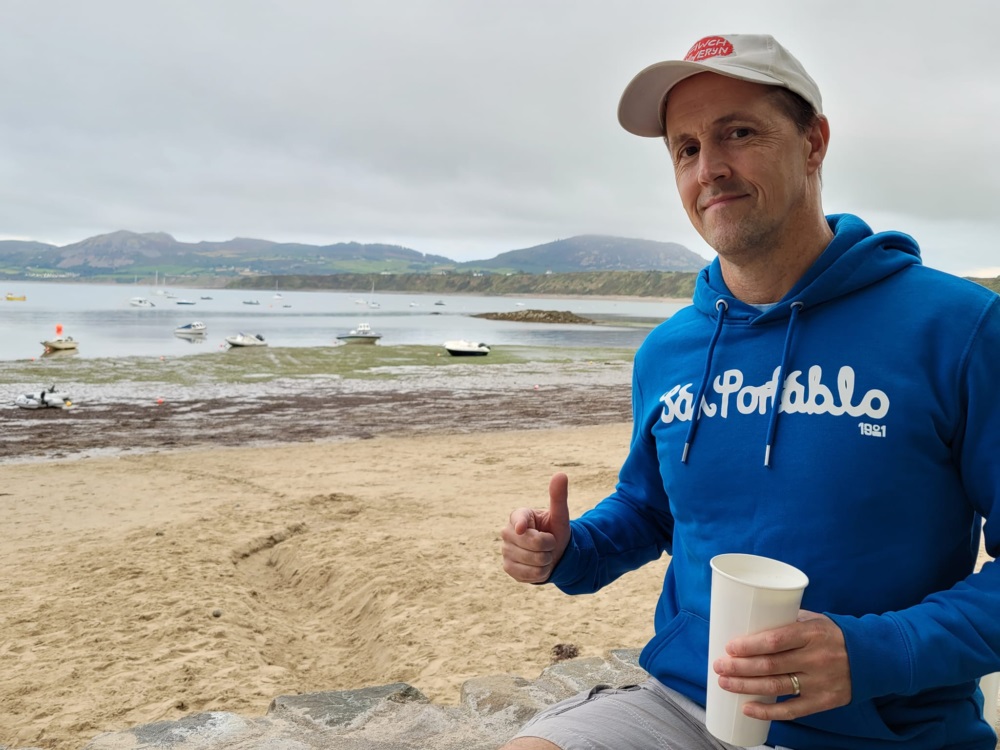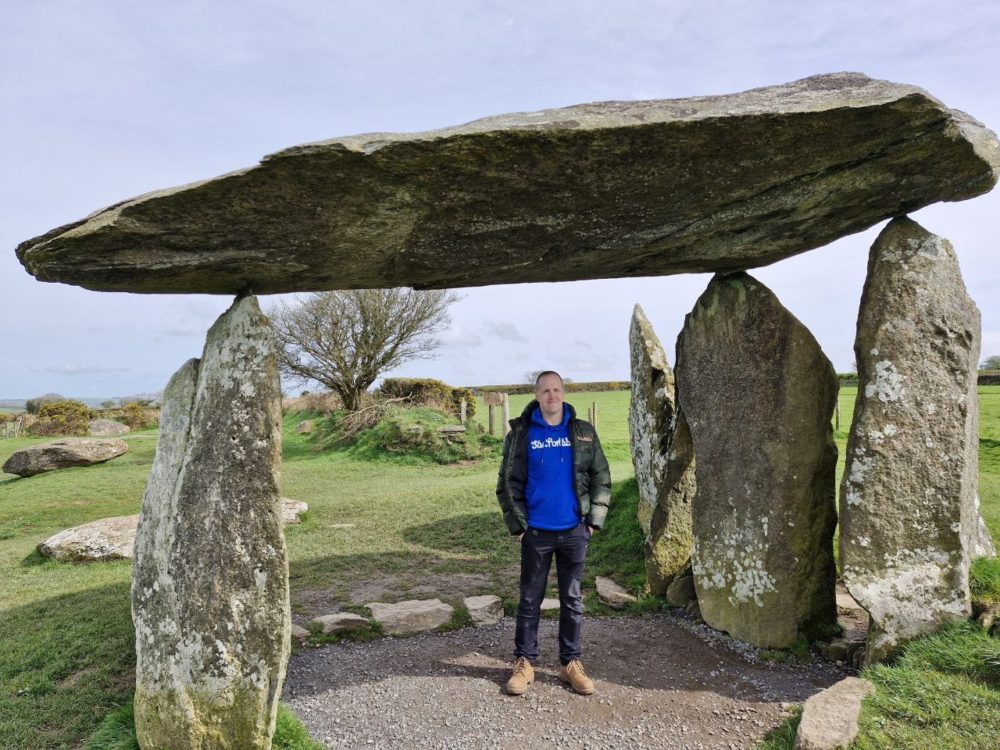Port Talbot to Birmingham and back again: A life-changing Welsh language journey

Stephen Price
David Roberts is an accountant from Port Talbot who began learning Welsh after moving to Birmingham for his studies and missing the ‘Welshness’ of his surroundings.
Having taken night classes for a couple of years, and worked through books and courses with nothing to show at the end of it, he often found himself giving up, but always promising to give it one more go, never actually imagining that he would be confident or proficient enough to speak the language.
But recently, his determination has helped him break through any setbacks and confidence issues he had and he’s back in the saddle and more passionate than ever – and he’s also using his Welsh out in the wild where it belongs.
David’s story
None of my family speak the language. The one exception was my Gran, on my father’s side.
She was from Cwmafan, in the Afan Valley, which at the time was a very strong Welsh-speaking place.
When she met and married my Grandfather, who was from Aberafan, they bought a house in Aberafan.
When my Gran passed away, when I was in my early teens, my family lost its last Welsh Speaker, as my father and his sister didn’t inherit the language from her, as they grew up in an English speaking environment, in Port Talbot.
I have fond memories of hearing my Gran speaking Welsh on the phone to some of her friends. I also remember her helping me with some Welsh homework from school.
I wasn’t really interested in Welsh back then though, it didn’t seem cool at the time – something I would live to regret a few years later.
A move across the border
I first became aware of, and then intrigued by Cymraeg, believe it or not, when I went away to Uni in Birmingham. Or more precisely, the lack of Cymraeg.
No Welsh road signs, no Welsh on TV, and hardly any Welsh people! (as you’d expect in Brum).
However, when you did meet another Welsh student, there was obviously a connection there and very often they would ask me if I spoke Welsh and I would squirm in embarrassment when replying, “No I don’t..”
At the end of one term, I visited the Language Labs & started doing one of their courses, using some old tape recorders. I picked up a few phrases, but that was about it.
After leaving Uni, I moved to Cardiff, to start work and training. I worked with alot of Welsh speakers, as the company I worked for had a lot of Welsh speaking clients, dotted all around Wales.
Again, I started to learn the language, using a book I borrowed off a friend but without much structure. My attempt wasn’t very successful and didn’t last long.

After moving back to sunny San Portablo (as we call it in Port Talbot!) I then found myself working in Llanelli for a few years, and there were lots of Welsh speakers working alongside me, and it was common to hear Welsh in the workplace.
A year or two later, I decided to “do it properly” and enrolled on a Welsh course, in Neath College, and then Pontrhydyfen.
I did this for a couple of years and was more successful this time, had a basic understanding of the language, but was still far from being ably to hold much of a conversation with people.
The main problem,was that after finishing work, and then heading off to college a couple of nights a week, the last thing I felt like doing was pulling the books out, or going to a Welsh meet up to practice.
Eureka!
Fast forward 15 years, or so, and I decided to give it one last go….before finally giving up and admitting that I will never be able to speak Cymraeg.
This time however, I did it differently, I decided to do it on my terms.
I used my old notes and books, but also used online apps and resources, but the big difference was I tried to make the effort to get out and use the language in a real-life environment.
I started going to a Coffi & Sgwrs meet up with a mix of other learners and fluent speakers, down Aberafan Beach most weeks.
Initially I didn’t say much, and understood little of what they were saying, past the basics.
But bit by bit, I did start to understand more, and spoke a little bit, here and there, and carried on with my own stuff at home.
Then lockdown hit and all of a sudden the meet ups stopped.
However, as there was nothing else to do, I knuckled down to my welsh study at home (mostly with a glass in hand, it has to be said) and also the discovered the world of online Welsh Chat meet ups on Zoom etc. so my progress continued.

I clearly remember the first time I ever used my Cymraeg, in the wild, away from the safety of a learners meet ups.
We were driving up to the north of the country and stopped off for a coffi in Mychynlleth and I overheard people speaking Cymraeg in the Coffi Shop.
I walked up to the counter, a bag of nerves, sweating profusely and managed to mumble something along the lines of “Ga i cappuccino a latte plis? Ac un teishen” and handed over a tenner, and didnt even look at the change.
Amazingly, the girl serving soon brought out the coffees and my cake. Wow, I was making progress!
Cerddoriaeth
A massive part of my journey into Cymraeg is discovering Welsh Language Music.
I have always been a music lover, but dicovering Welsh music has opened a whole new world to me that I previously didn’t know existed.
Old classic Welsh Folk music such as Ar Log, Meic Stephens, Ac Eraill, Plethyn and modern Welsh Folk like The Gentle Good, Cynefin, Brigyn and well as a whole host of rock bands like Adwaith, Jac & Morgan Elwy, Elis Derby, Candelas, Gwilym Bowen Rhys, Fleur De Lys, Geraint Jarman, Cerys Hafana and the new wave of Hip Hop Cymraeg like the mighty Sage Todz, & Lloyd a Dom…the list goes on and on.
The highlight of the year for me is usually Tafwyl in Cardiff!
I would love to go to lots more Welsh gigs, but they are few and far between in this part of Cymru – the occasional one in Pontardawe, and that’s about it, sadly.
However, my interest in Welsh Folk music led me to a monthly folk session in Pontardawe.
I have been going as an observer until recently, but have been learning to play the tin whistle for the last few months and have started joining in the sesiwn (with a couple of pints, of course) along with lots of guitars, fiddles, flutes, a harp, accordions, melodians etc.

A big part of my learning journey has been watching the soaps (Pobol y Cwm and Rownd a Rownd) and also watching Heno,every night on S4C.
Heno is a great program, with lots of relatively simple, relaxed conversations, which is great for learners unlike some of the more serious, more difficult programs.
Also, a massive shout out to Radio Cymru, which I listen to every day – usually using the BBC Sounds app, on my phone.
My favourite programs are the music ones with Mirain Iwerydd, Huw Stephens and Tudur Owen.
Heddiw / Today
I now consider myself a Welsh Speaker.
Am I fluent? No, far from it! Will I ever be fluent? I doubt it!
Mainly because I have very limited chances to actually use and improve my Cymraeg. Usually I speak Welsh not much more than twice a month, if that.
There is a weekly Coffi a Sgwrs meet up on Aberafan Beach, but this is on a Friday morning, when the majority of people are in work, so I only manage to get to it every few weeks – and about half the people speak Welsh at the Folk Sesiwn in Pontardawe that I attend once a month.
Apart from this, my opportunities to use the language are very limited in my daily life.
Wrth fy modd
An exception to this is, as often as possible, we go Campervaning in west & north Wales and I am wrth fy modd practicing my Cymraeg everywhere!!

One thing that probably held me back with my previous attempts at learning, that I have done differently this time is that I now pay much less attention to mutations, grammar, masculine/feminine stuff etc.
So my Cymraeg is far from perfect, and I will never be on the stage in the Eisteddfod but I can and do hold conversations entirely in Welsh, with the odd English word thrown in, where needed.
This is something I plan to improve on, going forward, but I’ve never let it hold me back.
Another spin off from my learning Welsh is my growing interest in Welsh place names and how they are so descriptive, and so important.
I joined the Welsh Place-Name Society/Cymdeithas Enwau Lleoedd Cymru and have since become a Committee Member.
I would encourage anyone interested to look at their website at the great job they do and consider joining! https://www.cymdeithasenwaulleoedd.cymru/en/
And now some Negatives…..
A million Cymraeg speakers is a great ambition and something to aim for, yes….but do I think we will achieve it… sadly not.
The language profile is changing, especially, heartbreakingly, in the language heartlands… however, I do think the opposite is happening, and will continue to happen in the Anglicised areas in the south and east of the country, as more young people speak the language than older people.
However, one thing that does need to change is the perception of the language.
Cymraeg is currently looked on as the language of school and (previously) the chapel and other boring stuff. This needs to change, and Cymraeg needs to be integrated more across society.

For example, in my area, there is not a single pub meet up night for Welsh Speakers. We only have the occasional gig in Pontardawe, which is over a 20 mile round trip from Port Talbot.
For the effort involved, people might think what is the point of someone learning the language? The meet up in Aberafan I mentioned is on a Friday morning, when most people are in work hence (apart from me) there is no one there who is under retirement age (Hope I havent forgotten anyone here, or I’ll be in trouble!!).
In my 6 years of learning Welsh with more determination and focus, I have not convinced one single other person to learn the language. Not one. That tells its own story.
Another, very local factor, is the imminent demise of the Steel Works in Port Talbot.
Amongst other (all negative) effects, we are likely to see younger people drift away from the area to find work in Swansea, Cardiff and much further afield.
This can only negatively affect the number of Welsh speakers in the area.
So, my learning Cymraeg has been a life-changing journey, incredibly positive overall, only held back by my lack of opportunities to use the language.
And it’s these opportunities I hope to see grow for others who, like me, simply want to live more of our lives speaking our native language.
Click here to find out more about SaySomethingInWelsh.
Click here for more info on DuoLingo.
Click here for information on local Wales-based Welsh classes or London classes (Not exhaustive so please check social media and search engines for what’s on in your area)
Click here for Welsh Government information on Welsh schools and outside activities for children.
Support our Nation today
For the price of a cup of coffee a month you can help us create an independent, not-for-profit, national news service for the people of Wales, by the people of Wales.







When I was in Brum there were more Welsh speakers than PT
Credit to David Roberts for learning Cymraeg. Sometimes it takes either living outside Wales or those from polyglots from other countries who take the time & effort to teach themselves our language in turn effectively motivates you into learning, in some cases out of embarrassment, because they know more about your language, history & culture than you do. Sadly not all were lucky enough in the past to live in counties predominantly Cymraeg speaking like Gwynedd or Caerfyrddin or in catchment areas with language provision . In reality it shouldn’t be this way. All schools in Wales should be taught… Read more »
“After all, English is a foreign language to Britain” As were the Celtic languages. What became Brythonic originated on the continent. It’s basically an earlier parallel to English. Interestingly, just as Brythonic was heavily latinized by the presence of the Romans on its way to becoming the Cymraeg we know and love, so was English. The influence of French – a later descendent of Latin – key in the transition into modern English. What we can certainly say is that both languages evolved here in Britain and in that sense, both are British and both played a critical role in… Read more »
Great stuff David, I spoke Cymraeg until my parents moved to Lloegr when I was 6, and that was the end of that. Now in my fifties I’ve started learning again, initially via Duolingo and for the past two years on learnwelsh.cymru courses. I’ve even passed a couple of exams along the way! Conversation is still difficult, but to be able to read and write in my own language after all this time is a wonderful thing indeed.
Stori anhygoel!